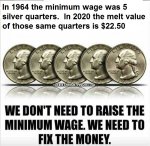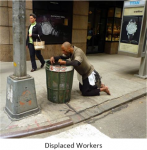I posted the photo below on my Facebook account on Sunday with the caption “Live photograph of what a national $15 minimum wage looks like:”

Some readers mistakenly took that post as an attack on poor people, which of course completely misses the point. The point is that, once the government requires fast food businesses to dramatically increase the costs associated with the jobs they provide, many, perhaps most, of those jobs will simply go away, and the workers at, say, McDonalds will increasingly be displaced by the technology seen in the photo.
I got my first actual job when I was 14 years old, helping a couple of guys run the local mini-golf park. From that point forward, I worked every summer and Christmas break throughout my high school and college years, and held jobs during many in-school semesters as well. Every one of those jobs was a minimum wage job, and I was lucky and happy to have them, even the welder’s helper job on a pipeline construction crew, working 80-90 hour weeks in the heat of South Texas summers. With time and a half for overtime, even that $2.10 minimum wage in effect in 1976-77 added up to a decent sum of money by the time September rolled around.
I also worked various jobs in local clothing and hardware stores, where I learned how to do things like deal with ornery customers, measure an inseam, iron shirts, cut pipe, wrap Christmas gifts and put bicycles together. Over one Christmas break, since I was then majoring in accounting, I was assigned the task of taking inventory in a hardware store that had at the time been in operation for more than 80 years. You could never believe how many hundreds of thousands of screws, bolts, washers and nails one store could accumulate over such a long period of time.
I also worked for little while as a checker at a grocery store and for maybe 3 days as a waiter, but that was one job I couldn’t hack. I’ve been extremely courteous to restaurant wait staff throughout my life as a result of that awful experience.
The point here is this: These minimum wage jobs are an important element of our society’s cohesiveness and evolution, and the more we have of them, the better off our society will be. Jobs like these not only serve to keep people from becoming dependent on the state, they serve to teach young people many useful skills in life.
In my own life, I could directly link that experience taking inventory to my early career as an accountant. That experience working summers in the oil field was a catalyst for developing an interest in the oil business, in which I spent my entire adult life. The experience in sales directly helped prepare me for a later career as a lobbyist.
Many people like to make fun of “burger flippers” working at fast food joints like McDonald’s, but these are some of the most useful starting jobs a person can have. Think of the various skillsets young people develop while in such jobs. For starters, you learn how to cook things, which is one of the basic keys to human life. But you are also customer-facing much of the time, and learn to develop skills in dealing with difficult human beings, who, trust me, are every-freaking-where you go.
At a burger joint, you also learn how a basic supply chain operates, from the patties to the grill to the bun to the bag and out the window to the customer, adding accessories like salt, pepper, onions, lettuce, tomatoes, mustard, fries and ketchup and a 32 oz. soft drink with extra ice along the way. You may think it’s all trivial and tedious when you’re 20 years old and doing it, but these are all skills you will lean on throughout the rest of your life.
When the government artificially sets prices on these jobs that are so high that businesses can’t remain profitable with their current work force, many of these jobs start to disappear, and many young people lose their means of learning these important life skills. Millions of teenagers and college students aren’t lucky as I was and my grandkids are to have two parents to help them learn such skills, and the lack of job opportunities can hinder their abilities to make an adequate living as they progress through life.
I’m all for paying people more money, and many companies have commendably moved to a $15 minimum wage voluntarily in recent years. Other companies that can only remain profitable at lower wage levels haven’t done that, which is how a free market system should work. When those companies are forced by the government to pay more for their workers, they will either adapt by cutting some of their jobs or go out of business entirely, taking all of their jobs with them.
That’s the point of that picture. It has literally nothing to do with demeaning poor people, and everything to do with wanting as many people as possible to have the jobs where they will develop the skills they will use for the rest of their lives.
That is all.







